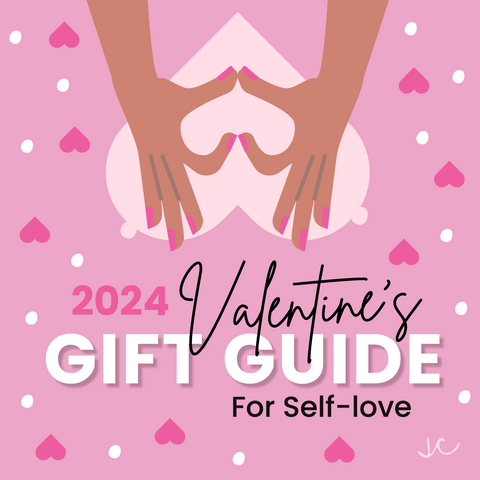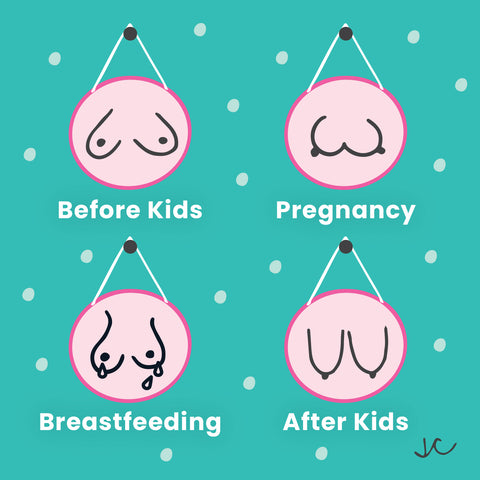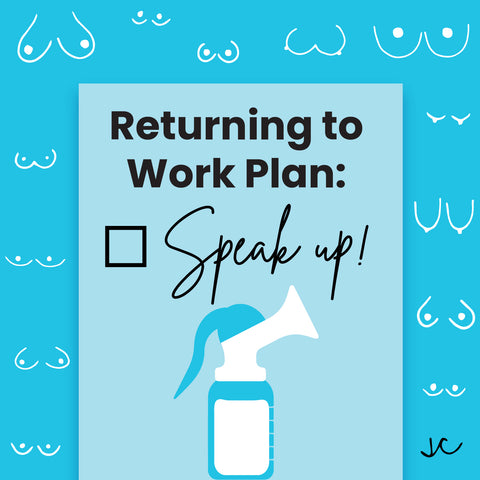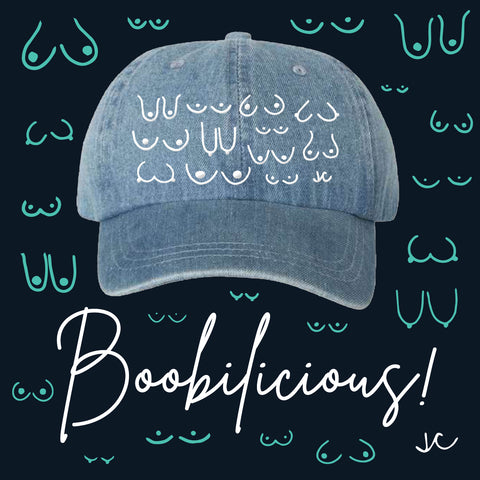What is Postpartum and What Does it Mean?

Estimated read time: 14 minutes
OK. Let's get real, mama!
We might get all the preparation in the world for what happens when we’re pregnant. We go to pregnancy and birthing classes, sign up for emails and updates about how our little bun is growing, and listen to friends and family tells us all about their experiences with birth.
But, what about the period of time that comes after giving birth? You know — when your little guy or gal is finally here. Postpartum.
So, what is postpartum? What’s it like? How will you feel? In this article, we’re going to break down all the jazz about life postpartum, what you can expect, and how to look after yourself. Because postpartum life can be tough, mama. And we’re here for you every step of the way.
What does postpartum mean?
The first six weeks after you give birth is known as the postpartum period. These six weeks can feel like an eternity and seem to fly by all at the same time. It’s a super important time for both you and your baby as you adjust to life after pregnancy, establish breastfeeding, are deprived of sleep, get to know your little one on the outside, and adjust to life as a new mama.
How long is the postpartum period?
Although it is generally accepted that the postpartum period covers the first six weeks after birth, some researchers believe that this period can actually last up to six months. That’s because so many changes are happening in your body at this time, from healing from birth to those intense hormonal mood swings. It’s a real rollercoaster!
It’s no wonder the postpartum period is also known as the fourth trimester.
What is postpartum like?
The postpartum differs for everyone. In general though, it can be a difficult time filled with mixed emotions. On one side, you have your gorgeous baby in your arms and you’ve never felt love like it. On the other side, you’re dealing with breastfeeding, lack of sleep, discomfort from birth, hormonal and body changes, and dealing with the demands of your new baby.
You might also find that you suffer from postpartum hair loss. Now, that’s a fun one! A few weeks or a couple of months after giving birth, it’s totally normal for you to lose hair. And we mean A LOT of hair… annoyingly, not from your legs or under your arms, but from your crowning glory. All those lovely pregnancy hormones that were keeping your hair full and bouncy have now gone, and all the hair you would have lost during that time (normally up to 100 strands a day) will suddenly start coming out in chunks.
Don’t worry though. If you’re wondering how long does postpartum hair loss last, then the answer is it’s only temporary. This is super common in the postpartum period, but as the effects of pregnancy-related hormonal changes slowly subside, your hair should return to its normal state - usually within six months. Phew!
So, yeh. Postpartum is a heck of a ride.
This is a time when you need more support than ever before - from your partner, friends, and family. Not only do your physical needs require attention if necessary, but your mental and emotional needs are just as important.
Let’s have a look at what postpartum looks like on a week-by-week basis.
Week one postpartum
You’ve just given birth! Congrats, mama.
During the first week postpartum, you might be in a hospital or be fit enough to be sent home. During this time it’s completely normal to experience a lot of pain or discomfort, whether you had a vaginal birth or a c-section. Your perineal region might be bruised, tender, or sore, especially if you had a bit of tearing or needed an assisted birth.
If you had a c-section then you’ll need extra time to recover as you’d just had major abdominal surgery. You might also have a catheter for a couple of days and c-section gas pains. Ouch!
It’s also totally normal to experience post-birth contractions (especially if you breastfeed). These can feel like normal contractions and it’s your uterus slowly contracting back to its pre-pregnancy size (again, this usually happens over the first six weeks).
Oh, and then there is post-birth bleeding (not to get confused with your first period). This can look like a regular period, starting bright red and then gradually turning brownish and reducing. Stock up on those maternity pads mama, they’re a lifesaver.
You’re also going to experience some pretty major hormonal changes, which can lead to mood swings, bursts of joy and happiness, and then floods of tears. This happens because your estrogen and progesterone levels are decreasing while your prolactin and oxytocin levels increase and decrease throughout the day as your body makes breast milk and you breastfeed.
Weeks two to five postpartum
You might find that your bleeding decreases or even stops during this time, but it’s also normal for it to continue for up to six weeks. If you’re in any way concerned about the amount of blood you’re losing then speak to your doctor.
During this time, your body is in the throws of healing, whether from a natural birth or c-section. You might find your vaginal area gets a bit itchy as it heals or you feel tender and swollen.
This is the time when the baby blues or postpartum depression can also hit. We’ll look at the main difference between the two a little later.
Don’t put any pressure on yourself at all during this time mama. Your body has just done an incredible thing and you need time and space to recover and adjust to your new life with your baby. Take all the help you can get, sleep and rest as much as you can, and make sure you’re eating and drinking well.
Both you and your baby are going through major transformations and it’s totally OK to feel overwhelmed. Just make sure you speak to those you love and trust so they can be there to help and support you.
Week six postpartum
By this time your uterus should have shrunk back to its pre-pregnancy size and your bleeding should have stopped (again, this isn’t the same for every woman).
If you’ve had the sign-off from the doctor then it may be possible to start gently exercising and having sex again (if you want to). Many women don’t feel up to it for a much longer time, and that’s YOUR choice. Don’t put any pressure on yourself or be pressured by others. You know your body and mind better than anyone else, so do what feels right for you.
If you haven’t suffered from postpartum depression then you might find that your emotional and mental state improves, although you will still feel tired and even anxious. If your feelings are stronger or not improving then it’s a good idea to speak to your doctor.
Remember. Just because the postpartum period is said to last six weeks, this does not mean that you have to feel back to your old self again once the time period is up. Your body won’t look or feel the same as it did pre-pregnancy, and you might not feel the same. It took nine long months for your body to grow your precious baby and it can take that long, or even longer, for you to feel like your old self again.
What is postpartum depression?
Thanks to all those hormonal changes, it’s completely normal for your emotions to be all over the place after giving birth.
This is known as the baby blues, and, unlike postpartum depression, it’s typical after giving birth. Postpartum depression on the other hand is different. Let’s have a little look at the differences between the two.
Baby blues vs postpartum depression
The best way to figure out if you have the baby blues vs postpartum depression is to gauge the amount of time you’re not feeling yourself. A couple of days after giving birth is when the baby blues tend to kick in. This can make you feel stressed, tired, weepy, sad, and exhausted, which is confusing when you think you should be feeling nothing but joy and happiness.
The baby blues is a normal part of the postpartum journey, and as your hormones settle down, these feelings usually go away. Normally within a few weeks after giving birth.
Postpartum depression, on the other hand, is a serious mental illness, which directly affects your behavior as well as your mental and physical health. Feelings of sadness, restlessness, loneliness, and feeling like you’re not bonding with your baby can last much longer than just a few weeks. While some women can experience postpartum depression straight after delivery, it can manifest within the first year of giving birth.
If you think you might be suffering from postpartum depression, or are worried about it developing, then it’s super important to reach out and get the support you need. Speak to your doctor or a trusted medical professional. We know it’s hard mama, but we’re so proud of you for getting the help you deserve.
Invest in a postpartum doula
If you’re feeling like you could use a little extra support during this challenging (but still wonderful) time, then you might want to consider investing in a postpartum doula.
These specialists provide families with information and amazing support on everything from feeding, breastfeeding, physical and emotional recovery, coping mechanisms, infant soothing, advocating for you, promoting self-care, referring to additional support in all areas of parenthood, and tips for settling your baby. Some even help out around the house with housework, cooking meals, and helping with your other children, if you have them.
Although they are an investment, the support postpartum doulas give can be worth its weight in gold.
Postpartum gifts
If someone you love is in the postpartum period, treating them to something special to make them smile can make all the difference in the world. It shows that you’re there for them, you understand what they’re going through, and you care.
Some of the best gifts for new moms come in the form of small acts of kindness. Cleaning up around the house, organizing meals to be delivered, taking care of her other kids for a couple of afternoons a week, arranging for groceries to be delivered, or just spending the night so she can get some much-needed rest.
Then there are postpartum care packages. Choose some thoughtful gifts such as breastfeeding-friendly tops, a cute tumbler so they can always have their favorite drink by their side, hair ties to keep their hair out of baby’s grasp while she breastfeeds, and finish your unique gift for new moms off with a beautiful handwritten card letting her know how proud of her you are.
You're the Tits
We know how tough the postpartum period can be mama. And we’re here to tell you that you’re amazing. You should be so proud of yourself.
At Titty City Design, we believe that every boobie is beautiful, and that should be celebrated. We are a female-owned and operated, small business here to spread self-love and body positivity with our line of boob apparel, boob accessories, and boob-themed decor and products for the home. A portion of our proceeds goes to help support postpartum people and breast cancer patients.
Products that Breastfeeding Moms Love







